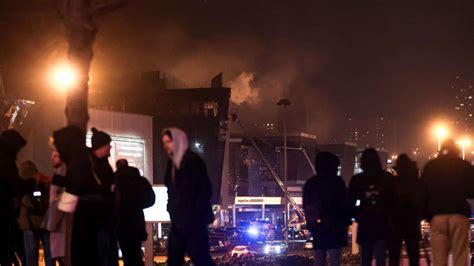
Daesh’s attack in Moscow and its wider implications
While global attention has been fixated on the Russia-Ukraine War and the intensifying great power competition of the United States with Russia and China, Daesh has quietly rebuilt itself and seems ready for a violent comeback. Daesh’s attack in Moscow brings into sharp focus the potential rejuvenation of its global network, albeit differently from its erstwhile peak.
On March 22, four well-armed Daesh militants dressed in military fatigues attacked Moscow’s Crocus City Hall and killed 133 concertgoers and torched the building with firebombs. Though Daesh’s responsibility claim did not mention any specific branch, there are strong indicators that Daesh-Khorasan acted in concert with the group’s Caucus branch. Khorasan refers to a historical region comprising parts of Iran, Afghanistan and Turkmenistan. On March 7, Russia foiled Daesh-K’s plot to target a synagogue in the Kaluga region. Subsequently, the US embassy in Moscow warned its citizens of an impending Daesh-K attack on large public gatherings in Moscow and shared the same information with Russia. Taken together, these developments strengthen the impression of Daesh-K’s involvement in the attack. Since 2020, Daesh-K has been Daesh’s most lethal branch involved in several attack plots against India, Iran, Turkey, Pakistan, Germany, Vienna and the Central Asia Republics, among others.
However, the March 22 attack in Moscow is not the first time Deash has hit Russia or its interests. For instance, in November 2015, the group bombed a Russian commercial plane in Sinai, Egypt in revenge for the Russian airstrikes in territories under the group’s control in Syria. Likewise, the group targeted the St. Petersburg metro with an explosive device in April 2017, killing 16 people. Similarly, Daesh-K attacked the Russian embassy in Kabul in September 2022, leaving two embassy staff and four others dead.
Russia has been in the cross hairs of Daesh’s propaganda since the group’s creation in July 2014. In the early phases of group’s evolution, Daesh founder Abu Bakr Al-Bagdadi singled out Russia with the US as the group’s prime targets for waging the war against Muslim countries. For instance, Daesh has sought revenge attacks against Russia for invading Afghanistan in the 1980s, its role in the Chechen wars and oppressing the Muslims the North Caucus. Likewise, Daesh also demonizes Russia, and Iran, for colluding with the Bashar Al-Assad regime in Syria and depriving the group of its territories. More recently, the Russian Wagner Group’s growing footprint in Africa where it had clashed with Daesh’s regional affiliates has also created bad blood between the two. Besides, Daesh-K has consistently targeted the evolving Russia-Taliban relationship since August 2021. Daesh-K suspects, like its partnership with the Syrian Assad regime, Russia is trying to eradicate the group from Afghanistan by colluding with the Taliban.
When Russia invaded Ukraine, Daesh-K quietly observed the war, while ramping up anti-Russia propaganda and intensifying efforts to make deeper inroads into Central Asia and Russian Muslim population areas, such as Dagestan and the North Caucus. In doing so, the group successfully recruited ethnic Uzbeks, Tajiks and Kyrgyz. Russian economic stagnation due to Western sanctions, ethnic discrimination and forced conscription of Central Asian migrants in Russia to fight in Ukraine created a fertile ground for Daesh-K to exploit. During this period, Daesh-K also launched its Tajik and Uzbek propaganda networks, translating its materials into local languages and assisted the group in spreading its tentacles into Central Asia. In subsequent years, Daesh-K’s overseas plots and attack showed greater participation from Central Asians, especially Tajiks.
At the same time, Daesh-K silently looked for an ideal opportunity to hit Russia knowing its forces were stretched thin in Ukraine. For instance, in an August 2022 statement, Daesh-K’s Al-Fursan Media urged its supporters to “be patient and wait for the opportunity to strike their enemies, including Russia.” Through such narratives, Daesh-K has also tried to wean away Muslim groups from participating in the Russia-Ukraine war. It bears mention that in the ongoing Russia-Ukraine conflict, Chechen Muslims are fighting on the Russian side, while Tatars are aligned with Ukraine. In April 2023, Daesh-K urged both the Chechens and Tatars to abandon fighting and redirect their armed resistance against Russia in Syria by joining Daesh’s Caucus branch.
Following its withdrawal from Afghanistan in August 2021, the US attention and resources have moved away from counterterrorism and mostly focused on geopolitical competition with China and Russia. Benefiting from this, Daesh through its regional branches has quietly rebuilt its network. In 2023, at least 21 international attack plots in the West and other parts of the world were traced to Daesh-K in Afghanistan. Similarly, in 2024, Daesh-K has carried out a twin suicide bombing in Kerman, Iran targeting a ceremony observing Qasem Soleimani’s death anniversary, killing over 100 people. Subsequently, the group attacked a church in Turkey. In the first week of March, Russia foiled a Daesh plot to attack a synagogue in Moscow.
The Moscow attack will re-energize Daesh’s worldwide network of affiliates, individual supporters and sympathizers. It will also fuel recruitment and publicity for the group, allowing it to reassert itself as the so-called leader of the global militant movement. The attack is also an indicator of how militant groups like Daesh are exploiting the geopolitical fault lines of the great power competition to stay relevant and advance their ideological and strategic interests. Russian mistrust of the US afforded Daesh enough space to carry out the devastating attack despite a clear warning.
During the Cold War, Russia and the US cooperated with each other on nuclear non-proliferation, resulting in several arms control agreements and treaties. The fear of mutually assured destruction compelled them to cooperate. Likewise, the presence of apocalyptic militant groups like Daesh and Al-Qaeda necessitates counterterrorism cooperation between major powers, geopolitical differences and competition notwithstanding, to make sure that such groups do not exploit existing fault lines to undermine international peace and security.
Source » arabnews.pk





